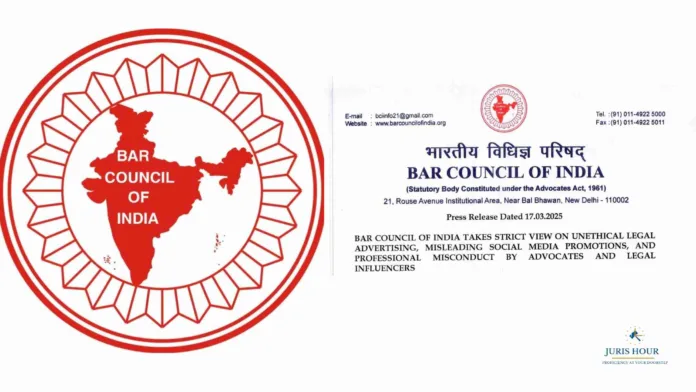The Bar Council of India (BCI) has taken a firm stance against unethical legal advertising and misleading social media promotions by advocates and legal influencers and using platforms like Quikr, Sulekha, Just Dial, and Grotal.
Exercising its statutory authority under the Advocates Act, 1961, the BCI has issued stringent directives to curb commercial advertisements by legal professionals, emphasizing that advocacy is a noble profession rooted in public trust and ethical standards.
BCI Condemns Influencer Endorsements and Digital Promotions
The BCI has explicitly warned against the increasing trend of advocates promoting their legal services through social media platforms, promotional videos, and influencer endorsements. The council has strongly condemned the involvement of Bollywood actors, celebrities, and digital media influencers in legal advertisements, stating that such practices violate Rule 36, Chapter II, Part VI of the BCI Rules.
The Supreme Court of India has consistently upheld the principle that legal practice should not be commodified through commercial advertising or solicitation. The BCI reiterated that any promotional activities by advocates via online platforms severely compromise professional integrity and ethical standards.
Stringent Disciplinary Action Against Violators
Following a landmark ruling by the Madras High Court on July 3, 2024, the BCI has issued a directive (Letter No.BCI:D:3417/2024 dated July 6, 2024) to all State Bar Councils (STBCs) mandating disciplinary action against advocates engaging in unethical advertising. The BCI has specifically called for action against legal service promotions on platforms such as Quikr India Pvt. Ltd., Sulekha.com New Media Pvt. Ltd., Just Dial Limited, and Grotal.com.
The judgment also rejected safe harbor protections under Section 79 of the Information Technology Act, 2000, stating that online platforms facilitating such violations are equally liable under the Advocates Act, 1961.
Legal Influencers Under Scrutiny
The BCI has raised concerns over the rise of unregulated legal influencers who, without possessing proper legal credentials, spread misinformation on crucial legal matters, including matrimonial disputes, taxation, intellectual property rights, citizenship laws, privacy rights, and GST compliance. Misinterpretations of landmark judgments—such as the Citizenship Amendment Act (CAA) and the Right to Privacy ruling (Justice K.S. Puttaswamy v. Union of India)—have led to widespread public confusion and misguided legal decisions.
Key Mandates Issued by the BCI
To address these ethical breaches, the Bar Council of India has mandated the following immediate actions:
- Prohibition of advertisements violating Rule 36.
- Ban on Bollywood actors, celebrities, and influencers promoting legal services.
- Immediate removal of misleading banners, promotional materials, and digital advertisements related to legal practices.
- Strict action against unauthorized legal advice dissemination by non-enrolled individuals.
- Absolute prohibition on social media or digital platforms for soliciting legal work.
- Implementation of stringent vetting mechanisms on digital platforms to prevent misinformation.
Severe Consequences for Non-Compliance
The BCI has warned of strict disciplinary actions, including:
- Suspension or cancellation of advocate enrollments for non-compliance.
- Referrals to the Supreme Court of India for contempt proceedings.
- Formal complaints to digital platforms for the removal of unethical content.
Upholding the Integrity of Legal Profession
Reiterating its commitment to ethical integrity, dignity, and professionalism, the Bar Council of India has appealed to all legal practitioners and digital platforms to comply with these directives. The BCI has urged lawyers to uphold public trust by refraining from commercializing legal services through misleading or unethical advertisements.
With these decisive actions, the BCI aims to safeguard the legal profession’s sanctity, ensuring that advocacy remains a noble service dedicated to justice and fairness.



![GSTAT Notifies Goods and Services Tax Appellate Tribunal (Procedure) Rules, 2025 [READ RULES] GSTAT Notifies Goods and Services Tax Appellate Tribunal (Procedure) Rules, 2025 [READ RULES]](https://www.jurishour.in/wp-content/uploads/2025/02/GSTAT-218x150.webp)

